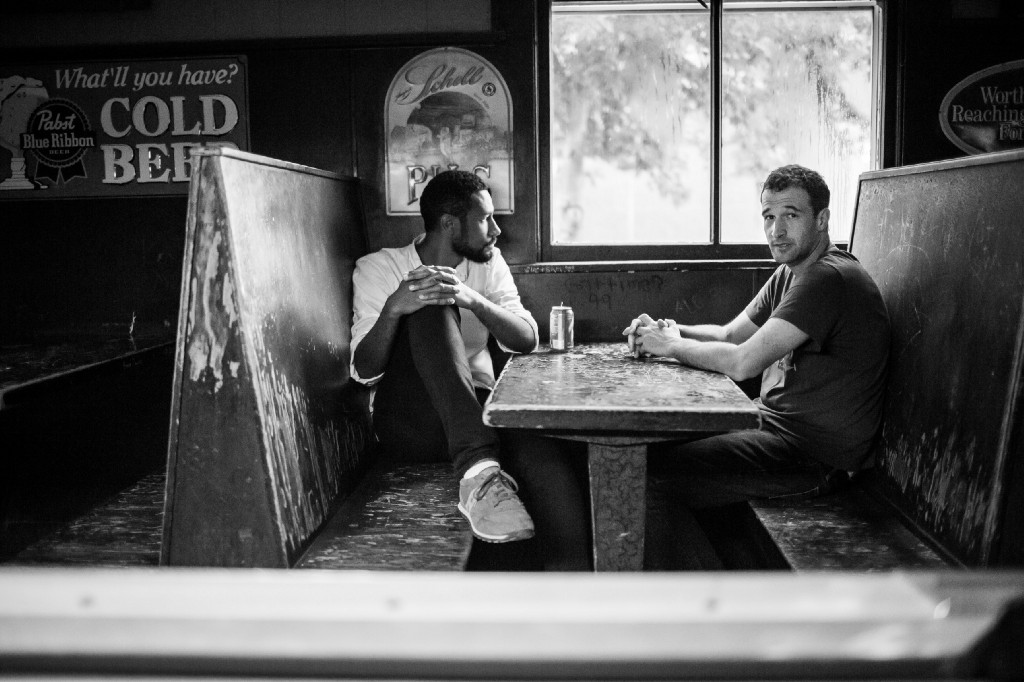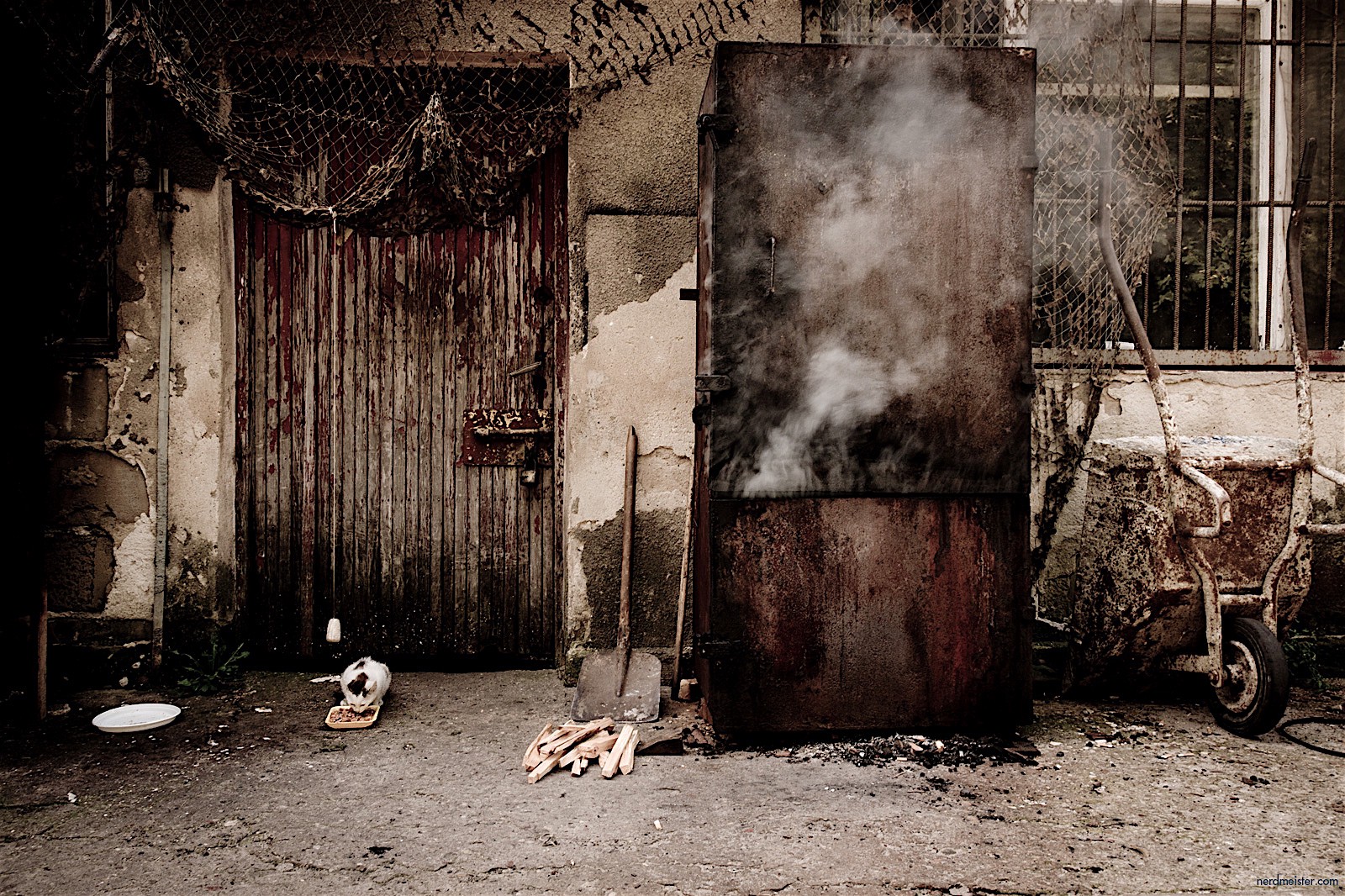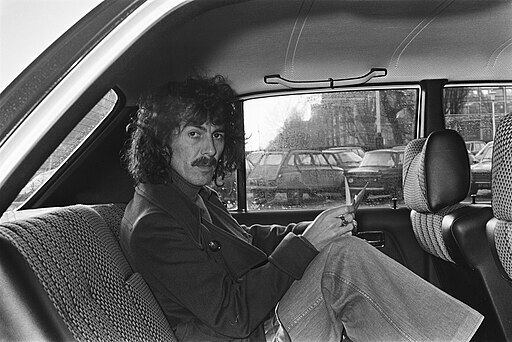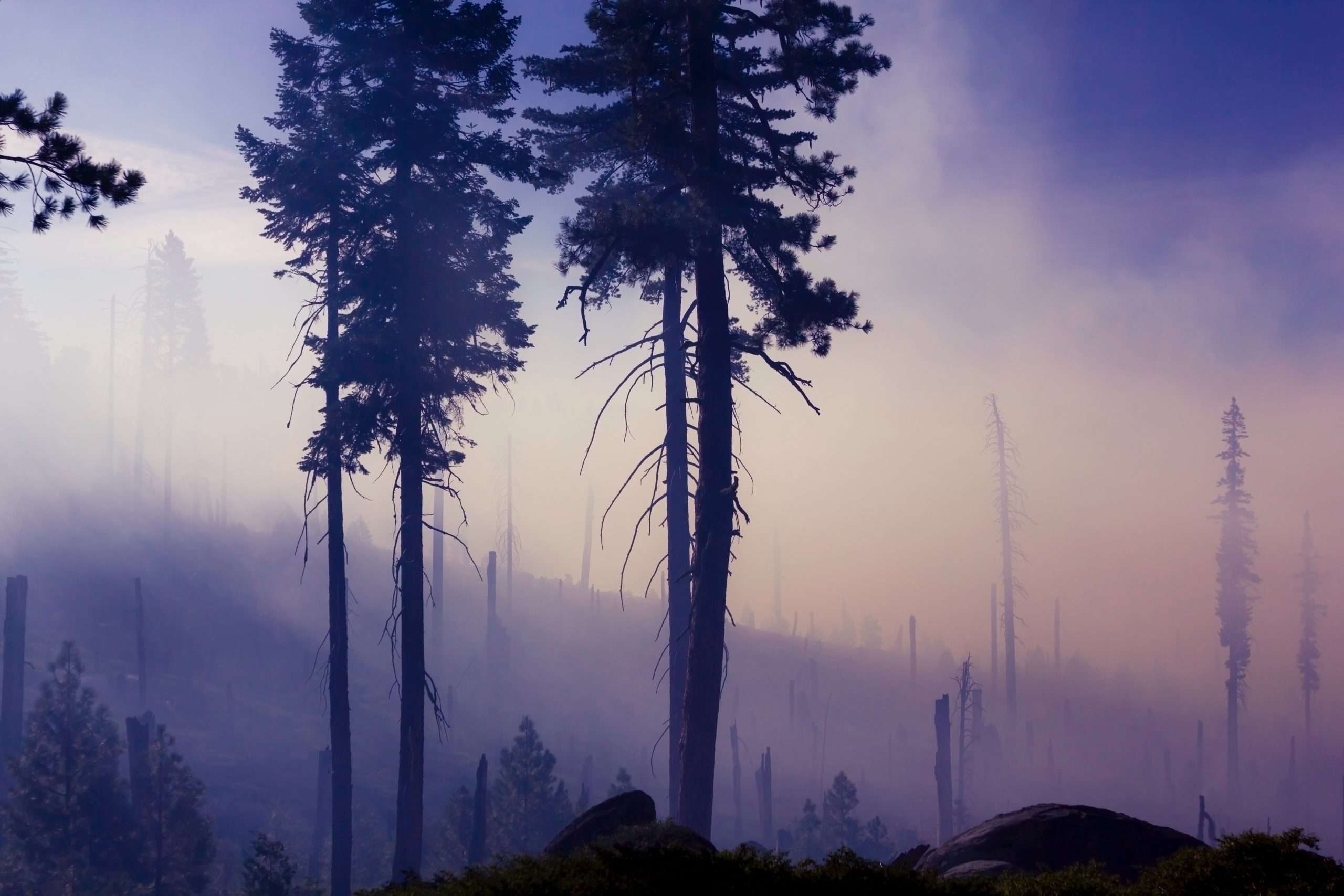Interviews
How to Explain the Nightmare

On the eve of a new tour, the Lonelyhearts are thinking about dystopias, Ghostface and the future of narrative songwriting

The Lonelyhearts are Andre Perry and John Lindenbaum, based respectively in Iowa City and Fort Collins. Since the band’s founding in 2003, they’ve released several well-received albums of narrative-driven songs, always poetic and gorgeously composed Americana whose lusher album arrangements give way to a more constrained and spare stage presentation of just a twelve-string acoustic guitar and a synthesizer. (I cannot recommend seeing them live strongly enough.) In addition to their work as musicians, both Perry and Lindenbaum have a background as prose writers, and Perry is also the co-founder of the Mission Creek Festival in Iowa City, an exciting annual celebration of music, literature, comedy, and other arts which brings together some of the best emerging talent in the country.
The Lonelyhearts’ latest album, The Age of Man, is something of a departure for the band, at least at first glance: a dystopian song cycle about strange weather, human/bat policemen, and refugee camps, its songs taking place across three generations of an alternative future America. It’s maybe my favorite of their albums so far: During a visit to Iowa City while on tour for my last novel, I had the privilege of hearing a few tracks while they were still being written, and the pleasure of listening to these works-in-progress on Andre’s living room studio left me anxiously hungry to hear the rest.
This summer, the Lonelyhearts are touring for several Midwestern dates with The Mountain Goats, beginning July 6th at Wooly’s in Des Moines, Iowa. Before they left, we discussed the literary argument that spawned The Age of Man, how we tell stories differently in lyrics and in prose, and how the invented world of an album comes into being.
Matt Bell [MB]: One of the fascinating bits of backstory to Age of Man is that it began out of an argument the two of you had while touring, specifically about Jennifer Egan’s A Visit from the Goon Squad, a novel built of interconnected short stories. Age of Man is a cycle of songs built along similar structural lines, each song its own story but contributing to the larger narrative arc of the album. Can I ask what the point of contention over A Visit from the Goon Squad was? Does Age of Man set out, somehow, to prove one or the other of you right?
John Lindenbaum [JL]: The album was actually inspired by two events — the aforementioned discussion of A Visit from the Goon Squad, and an unfortunate bat encounter in Andre’s apartment in Iowa City. As far as the Egan book, I think the argument was about whether or not the book is good. If I remember correctly, I claimed that the book succeeds because it weaves together a variety of perspectives to create a larger whole. I think Andre’s stance was that the book is just okay rather than brilliant, but now every novel about music will suffer from “it’s too much like Goon Squad” comparisons. We wanted to adopt the same multiple-perspectives several-generations conceit for Age of Man. I suppose that if you like our album, I was right. If you don’t, Andre was right.
Andre Perry [AP]: It’s true: We were arguing about the success of the novel’s structural premise. I didn’t think the whole narrative achieved “brilliance” as John noted but, damn, I respected Egan for making the effort. And, ultimately, she did craft some great stories within the entire book.
MB: The story in Age of Man takes place over three generations, and eventually includes plenty of speculative elements, including environmental disaster and radiation poisoning (“If I curse it’s just uranium in my brain / If I raise my hand it’s just the tailings building up in my veins”), bat-winged policemen and hyper-vigilant weathermen (“the watcher knows our sins / he calculates the winds”), and the failure of governmental and cultural institutions in a failing world (“Jesus was a good guy, I guess / but he never quite prepared me for this mess”). It’s a complicated story, but what we get is more impressionistic and allusional than expositional, which might be part of the difference between story collection and song cycle. Still, I wonder if there was a more explanation-heavy version at one time, or if you know more of the overarching story that what can be presented in these songs, each limited by a single narrator, singing from a single moment in the timeline. As someone reasonably ignorant of the typical songwriting process, I’d love to hear how the story was developed: did the plot exist separate from or even preceding the music, or was it collaged together as individual songs took shape? How much of this world never made it into the songs? Do you know a lot about these people and their lives outside of these moments?
JL: We developed the overarching narrative over the course of many, many lunchtime conversations. We had the general concept in mind before any of the songs were completed, but details changed as we worked our way through the lyrics of each song. For instance, I wanted “Repopulation Blues” to involve an IDP camp romance, but Ted’s new flame wasn’t one of the original set of characters. Many elements of the story might not be immediately clear to a listener, but yes, we see the various perspectives as combining to tell a cohesive story (in contrast to more of a Walter Benjamin-inspired putting-seemingly-unrelated-viewpoints-into-conjunction, which might better describe our previous records or the interludes in your Scrapper.)
And yes, we know additional details that aren’t explained in the lyrics (White Nose Syndrome in American bats, academic debates about “the Anthropocene,” Iran’s threat to blockade the Strait of Hormuz, the Bay Area male escort economy, etc.). Such an omniscient perspective violates Ted’s “no shahs/no creeds” claims in the final song, so maybe it too is doomed.
Alejandro Zambra’s Literary Mixtape
AP: In retrospect, the music and the final set of lyrics really did evolve separately in these songs. It was an interesting relationship: We had a story that we definitely wanted to tell but the songs’ structural confines — the chords and melodies and cadences we had put together independently of the lyrical conceit — determined how that story could be told. The phrases in “The Glow” allowed for us to fit a ton of words and thus narrative and insight into the song whereas “Escape From Bat City” has the shortest verses — it’s almost impossible to achieve reflective depth with verses that short. Those constraints really affected how the narrative came across from song to song. I mean, we knew that the music for “Escape From Bat City” was going to be about escaping the radioactive bats of Pittsburgh but if it had been different music the narrative would have unfolded with an alternative depth.
MB: Were there musical arrangements that you meant for the album that never found their lyrics? Formally, it’s interesting to think of the music as a constraint, which it obviously is (and often in a generative way, it seems), but also as a form seeking its own best content: the music wants a certain story shape, and you either find it or you don’t. Ten years from now, do we get the “Deluxe” version where those extra songs are possible?
AP: Somehow we made everything fit this time around. We found a home for each set of music, a place for each one of them on the record where they could become a piece of the story. To be honest, it was brutal at times — sitting around a kitchen table trying to come up with the words to both fit a certain phrasing and a narrative that not only satisfied the song but the overarching arc of the album. Specifically, I am thinking of “Rotterdam.” The lyrics took forever. Most of them were written very slowly in Fort Collins. It turned out to be one of my favorite songs. Not all of the songs were like that — sometimes the ideas and the words came quickly.
Given the epic scope of what we were trying to accomplish here, it’s my sense that the next record will be punchier and quicker on all fronts. It’ll be our Train Dreams.
MB: Growing up, the place where my dad’s taste in music and mine came together was in songs that told a good story. My dad read a lot less than me, but he would often talk about the stories from favorite songs of his, recounting their story beats the way I might describe a favorite novel. That’s one of the elements that attracted me to The Lonelyhearts, from the first time I heard you play live in a bar in Iowa City — I can still remember the story of “Ntozake Nelson” cutting through the chatter of the drinkers, the narrator’s voice pulling me toward that crushing line at the end of the final verse, “I may never fall in love but I’m getting to the age at which I’m willing to pretend.” Are there songwriter-storytellers who are particular influences for either of you? What constraints are you up against when you’re telling stories as songwriters, as opposed to writing in prose?
JL: My dad mostly listened to classical music, which I avoid, but our tastes also converged in songs that tell a good story (Springsteen, CCR). I’d never really thought about it like that before.
Storytelling — be it a straightforward beginning-middle-end arc or a series of evocative themes — is what I seek out in most music — the exceptions being post-rock bands such as Mogwai or Sigur Ros who soundtrack the weirdness inside my head. My list of favorite songwriters will probably seem painfully unsurprising: Neil Young, John Darnielle, Jeff Mangum, Low, Craig Finn, Jason Isbell, Vince Staples, Elliott Smith, Pusha T. For me, not all stories need to follow a linear path like “Long Black Veil” or “Johnny 99” — though I enjoy it when Courtney Barnett, Ghostface, or Jarvis Cocker spins a straightforward tale.
“Storytelling — be it a straightforward beginning-middle-end arc or a series of evocative themes — is what I seek out in most music…”
Andre is still an active prose writer. I haven’t written prose since the ’90s. So, for me, I only tell stories in the form of songs. I don’t find this limiting at all, though songwriting and prose are very different art forms. Even for a songwriter who often is accused of cramming far too many lyrics into a song, there are details, as you note above, that are going to be left up to the listener.
As a young songwriter, I think my real-life experiences and emotions informed the stories in my songs. Now, decades in, it’s much more of an inventive process — my own life still weasels its way in, but I am not always fictionalizing an event from my life. For the Lonelyhearts, I would argue that Age of Man is our first record that tells stories that are entirely divorced from our lives and those of our friends. In certain musical genres — Americana, trap-hop — it is expected that the songwriter write about her or his own life. I am happy that we are not constricted in that way.
AP: My dad was into jazz and I am into it too. I was feeling Coltrane and Coleman deeply as I grew up and now it’s more modern ensembles like Dawn of Midi or even someone like Nils Frahm. All of this to say I have always been interested in how music can evoke atmospheres and collective emotions — perhaps even before the lyrics get involved. I grew up in the mid-’90s and listened to Cuban Linx and Liquid Swords incessantly. The Infamous as well. I think what RZA and Havoc were accomplishing in terms of mood with those raw drum samples, eerie-ass jazz piano samples, and budget synths helped set the tone for me getting entirely blown away by GZA or Ghostface or Raekwon or Prodigy’s ability to tell a story through the lyrics. I studied those lyrics. I was a huge undercover nerd about it. As I got older I started to connect the dots to lyrical rawness via Lou Reed’s work with the Velvets. On some levels, his solo work really hit me harder than the Velvets. When he was really on I thought very few could contend with him. I mean that first verse of “Street Hassle” — he’s dancing these elegant phrases around each other while he’s talking about a body getting left for dead on the street and that little interlude he has Bruce Springsteen sing just to give everyone a break so they don’t cry — that shit is on point; it made you feel like you were literally on the street. After college I became aware of Grandaddy and the speculative worlds Jason Lytle constructed with that project. I think Grandaddy had a big influence on us as a band: synths, acoustic guitars, and a lot of lyrics — those were elements John and I could both agree on. I’d be remiss not to mention the Grateful Dead. Robert Hunter wrenched out some great songs with those guys. Like the Wu and Mobb Deep tracks, I used to stay up and listen to songs like “Rubin and Cherise” or “Terrapin Station” — Hunter was achieving these wild, beautiful narratives that were both his own stories and filled with all of these references to traditional folk tales — you needed a PhD to figure out what the hell was alluding to. And those narratives were so tight, you knew they took him forever to write; they didn’t fall out of him like those early gems: “Cumberland Blues,” “New Speedway Boogie,” or “Box of Rain.” In our more current era, I am keeping an ear to Jenn Wasner (Wye Oak), Angel Olsen, and Kendrick Lamar. Mitski’s writing on Puberty 2 is probably my favorite at this very moment.
Writing on the page is definitely a different form than writing songs, though I am interested in similar ends: figuring out how the most select details can reveal the most gripping story.


MB: John, I like your observation that certain musical genres expect “the songwriter write about her or his own life.” Maybe it’s because I grew up without knowing any professional writers or musicians or artists, but I mostly still take in art ignorant of the artist’s life: I often have no idea whether a song or a story is directly autobiographical until someone else tells me it is. It never really occurs to me to write that way, either, which I agree is a great freedom, maybe to instead look for the “most select details,” as Andre says. I was always taught that the universal is in the particular: that the more concrete and specific the detail, paradoxically the more universally accessible the emotion often becomes. (There’s a great bit in DeLillo’s Underworld about the “quotidian” and names of objects that always comes to mind for me here: the power of knowing the right names of things, the parts of things.) I wonder if that’s more difficult in songwriting, because of the size of the units of sense — you get such smaller phrases to work with than a fiction writer does: your images have to be more compressed, your dialogues less protracted. But one of the things I love about The Lonelyhearts is exactly that: the telling details in every line. So many songs — even by songwriters I truly admire — traffic in clichés and worn language, I think just because those clichés and bits of language fill in the music in places, and because they function as a sort of emotional shorthand. But it seems to me that the passage away from the known “realist” world toward the kind of invention on Age of Man frees you even further in the direction of the original image and new language. Was there a balance to strike in the worldbuilding here? A limit to how far you could push the invented future of the album without leaving the listener unable to follow you, especially given the relatively sparse amount of words you have to do your worldbuilding in?
AP: Each song must satisfy a number of key elements. We aim for compelling stories, vignettes, or impressions. We attempt to etch lyrics that are both clear and surprising to the listener. The music, we hope, will evoke a fascinating mood. All of those pieces must be in place. At each of those corners we fight to create a song that is in someway original. Perhaps the arrangement sounds familiar but the subject matter will be new. Or maybe the lyrical text reflects what you’d hear in a lot of folk songs but the sounds of guitars have been undermined by noisy synthesizers. There is a great need in our music to try as much as possible to avoid doing what has been done before. We often fail but sometimes it comes together. It’s not that we don’t like what’s come before there’s just this sense that if we are going to put these hours into attempting to craft songs for people to listen to they shouldn’t get a new Jason Isbell song or a Dandy Warhols track. Plenty of those songs exist and there are people who can make them better than us. John is particularly sharp about keeping us away from overused lyrics. It was cool when John Lennon told us love is all we need, but maybe we can’t say that again, at least not like he said it. We need to find a different way. And maybe it’s not even worth saying again; it’s possible Lennon locked that sentiment down, no one else needs to hear it ever again. What people might not have heard is that it’s possible to find love in a bat apocalypse. You’ll need more than love, though, you’ll also need to wage some biochemical warfare to eradicate the bats.
“It was cool when John Lennon told us love is all we need, but maybe we can’t say that again, at least not like he said it. We need to find a different way…What people might not have heard is that it’s possible to find love in a bat apocalypse.”
I’ve evaded your question to some degree: What I mean to say is that despite any invented narratives that shape an album, we are always focusing, I think, on the individual songs. In the case of Age of Man, we hope that someone who just hears one of these tracks will walk away and find something to hold onto in that track even if they don’t hear or can’t wrap their hands around the larger narrative at work. At the core of most of these songs there is still some universally understood human error at play among the characters.
JL: In my short fiction days (ahhh, the ‘90s), I also remember focusing on significant details to tell a much larger story. We certainly try to do that in our songs. We have spent serious hours debating the make and model of a car or which animal might have a broken leg. As far as fitting them all into short phrases, a general rule is that the songs with short phrases were started by Andre and the ones with an endless onslaught of lyrics were started by me. It is incredibly tricky to fit all the details I want into one of Andre’s tiny little verses. Still, I think that sort of challenge makes this songwriting partnership rewarding. Even though we are not ghost-writing pop hits for Disney, we do try to pay attention to catchiness and song length. I remember laboring to tell an entire story in the handful of notes that make up “Escape from Bat City,” for instance. Writing a cohesive album such as Age of Man makes it a touch easier, since we can refer to images or events from previous songs. We tried to ground all of it in a somewhat realistic world though, so I don’t think we gained much leeway detail-wise. The tent cities, criminal relatives, diseases, and military helicopters that appear in Age of Man could have featured on an earlier album of ours.
Tangentially, I am living in Mexico City for two weeks and just spent the previous three months reading contemporary Mexican fiction. While magical realism is just one of the many tools those authors employ, I don’t sense the same instinct to ground every single event in a plausible backstory. The radioactive vigilante bats might just show up in chapter 6.
To answer your question more directly, I did not feel limited in the sort of significant details or stories we could include. I would hope that most of the album makes sense to a listener. I suspect the rewriting of the ten commandments in the last song is the most head-scratching section.
I truly hope that the two novels of yours I have read are not autobiographical.
MB: We began this conversation last year, before Trump’s election and so much else that’s left our everyday world feeling very different than it did when we started. Returning to the album today, I do feel like I’m in a different listening environment than I was when we talked a few months ago. At the same time, I’m fairly suspicious of reading every work of art through current events, considering that most albums and novels are conceived of and written months if not years before the events they’re contrasted against: Age of Man is a dystopian album, but that doesn’t mean it’s responding to this set of circumstances. All that said, I wonder if playing these songs live has taken on a different tone or urgency recently: the album version is complete, but does the live set continue to evolve in response to the world in which it gets performed?
JL: It certainly is high season for dystopian art: The Handmaid’s Tale TV series, New York 2140, NK3, The Book of Joan, American War, Oryx and Crake, Borne, etc. We wrote these songs three years ago, before Trump was campaigning in coal country, so it’s almost as if the dystopian moment has caught up with us rather than vice versa. I agree that cultural and political context can change how songs are interpreted (remember when “Don’t Look Back In Anger” was just another catchy Oasis anthem?), but I don’t know how a live audience’s understanding of these songs has changed. We were fairly dark on our three previous albums as well, so I suspect the Age of Man songs are heard as “this time, with radioactive vigilante bats” rather than a complete genre shift like The Road or Zone One.
Still, we have written and arranged 10 new songs since we finished Age of Man, and maybe none of them would qualify as dystopian. My other band, Nadalands, continues to come up with new songs about impending apocalypse or social collapse, but I feel the Lonelyhearts have covered what we need to cover in that regard. It’s all ghosts, private aircraft disasters, and police brutality from this point forward.
“We wrote these songs three years ago, before Trump was campaigning in coal country, so it’s almost as if the dystopian moment has caught up with us rather than vice versa.”
AP: I almost agree with John’s remark about the dystopian moment catching up to us, but I would clarify even further: the dystopian moment has always been there; it’s just that people are more aware of it now. The current American political atmosphere has been with us for decades and in some ways since the beginning of our nation. Donald Trump isn’t the architect of this moment; he is a reflection of it. He doesn’t possess Sheev Palpatine attributes. He doesn’t even possess Anakin Skywalker qualities. Such dark talents belong to the likes of Dick Cheney or Roger Stone: sharp, conniving strategists.
As a citizen if you’ve been acutely aware of the nation’s tattered social fabric then these modern times are simply an affirmation of what you’ve been feeling all along — and you’ve likely been feeling them for awhile if you are gender non-conforming or an immigrant or a person of color or a person without access to cash, real estate, or education. A friend of mine recently unearthed an old Twilight Zone quote: “We will not end the nightmare, we will only explain it,” and I feel the Lonelyhearts have been on that vibe since 2004. Age of Man was a natural peak in our quest to represent just how turned around our systems are. But it’s not all bad news because ultimately these songs, especially when played live, are about catharsis and sharing a positive, real moment with other people — a community — whether it’s 15 or 300 people in a room together. We will chase that connection for the rest of our lives because a viable future relies on community.








